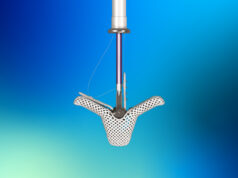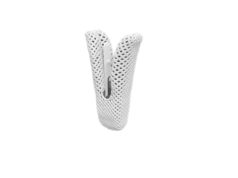
Hotly-anticipated results of the randomised TRILUMINATE pivotal trial, presented during the 2023 American College of Cardiology (ACC) annual scientific session (4–6 March, New Orleans, USA), indicate that transcatheter repair in symptomatic tricuspid regurgitation (TR) patients using the Triclip (Abbott) system was effective in reducing TR and led to improvements in quality of life at one year.
However, the results did not show any significant difference in survival or heart failure hospitalisation between patients treated with the interventional approach or with medical therapy, the study’s control arm, with the the superiority of the device in meeting its composite primary endpoint primarily driven by improvements in quality of life for patients.
Presented during the ACC meeting’s opening late-breaking trial session by Paul Sorajja (Minneapolis Heart Institute Foundation, Minneapolis, USA) and published simultaneously in the New England Journal of Medicine, the results from 350 patients are “very meaningful for a highly symptomatic population whose quality of life is impacted by TR”, the investigators have suggested.
TRILUMINATE Pivotal saw patients considered to be at intermediate or greater risk for tricuspid valve surgery randomised 1:1 to receive either transcatheter repair using the Triclip device or medical therapy at centres throughout North America and Europe. Patients in Sorajja’s one-year report had a median age of 78 years and the population consisted of 55% women.
All patients enrolled in the trial had severe tricuspid regurgitation and heart failure symptoms despite receiving medical therapy, and 51% had torrential tricuspid regurgitation. Most patients had either atrial fibrillation (AF), high blood pressure, or both. Patients who had severe left ventricular heart failure, untreated other valvular disease or severe pulmonary hypertension were not eligible to enrol.
Headline findings at 12 months presented by Sorajja indicate that the trial met the primary endpoint, a composite of mortality or tricuspid valve surgery, heart failure hospitalisation, and quality of life improvement ≥15 points assessed using the Kansas City Cardiomyopathy Questionnaire (KCCQ), evaluated in a hierarchical fashion using the Finkelstein Schoenfeld methodology favour transcatheter therapy (win ratio 1.48; 95% confidence interval 1.06 to 2.13; p=0.02).
Sorajja reported that the trial saw a significant reduction to moderate or less TR (grade <2) achieved in 87% of patients in the device arm at 30 days, compared to 4.8% in the control group. TR reduction was sustained at one year, according to the investigators.
Added to this, patients receiving the device saw a significant improvement in quality of life, with 50% of the investigational group reporting at least a 15-point improvement in KCCQ score at one year, next to 26% in the control group. The rate of hospitalisation for heart failure did not appear to differ between the groups.
“Patients with TR transcatheter edge-to-edge repair (TEER) with the TriClip device, experienced significant improvements in quality of life,” said Sorajja, the lead author of the study. “In a patient population with a high symptom burden, this is a meaningful benefit.”
Allied to the efficacy findings, investigators also reported that three patients (1.7%) had a major adverse event at 30 days (one death due to a cardiovascular cause and two cases of new kidney failure). Nine patients treated with TEER (5.2%) experienced a major bleeding event within one year. Five patients in the TEER group (2.9%) and five in the control group (2.9%) needed surgery to implant a permanent pacemaker or defibrillator within one year.
One limitation of the study is that it was unblinded, according to Sorajja—who relayed that patients and their clinicians knew who had received TEER and who had not. However, independent experts who were blinded to patient treatment assessed the hospitalisations, deaths and other adverse events that occurred in the study.
In addition, the study findings are limited to patients with TR features deemed more amenable to a reduction in regurgitation to moderate or less.










